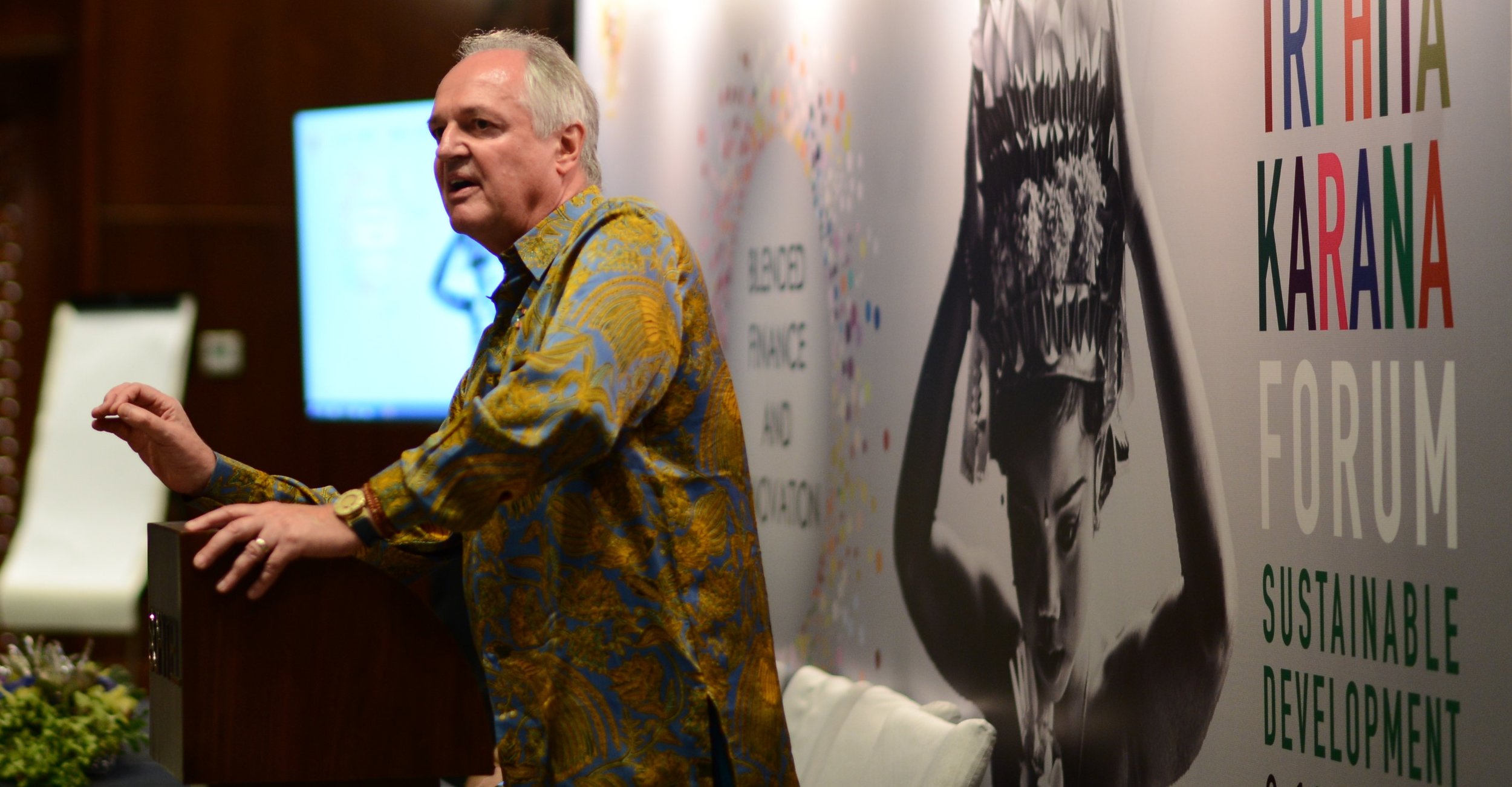The second Tri Hita Karana Forum returned to Bali in October 2018, five years after the inaugural gathering. The Forum aims to align global action for the UN Sustainable Development Goals (SDGs), with a particular focus on mobilizing private capital and innovation for the SDGs in Indonesia and South East Asia. As the fourth most populous country in the world, and one of the fastest growing emerging markets, Indonesia’s leadership on sustainable development is critical.
The Food and Land Use Coalition hosted a panel discussion at the Forum, at which leaders from across the finance community explored the key barriers and opportunities in financing sustainable food and land use systems. Food and land use offer at least 37% of the solution to reach net zero emissions by 2050. In Paris, 123 countries put food and land use in their SDG targets. But three years on, nothing has happened. No significant funding has been mobilised. The aim of the session was to explore why this is and identify the opportunities to drive change.
 Paul Polman delivers the keynote speech
Paul Polman delivers the keynote speech
“We need to rethink risk: the risk is in not acting, rather than in acting.”
– Lisa Genasci, Founder and CEO, ADM Capital Foundation
Many financiers still see food and land use as too risky to invest in. Yet speakers on the panel argued that these perceptions of risk are often misguided. The findings of the IPCC report prompt a reappraisal of risk. By failing to act, investors are not only missing out on huge opportunities but are also failing to recognising the risks inherent in unsustainable practices. Irresponsible practices are at risk of being subject to strict legislation; land degradation and deforestation weakens the resilience and productivity of supply chains; and consumers are starting to turn their backs on brands that fail to prove their positive impact in the world.
Long-term capital is critical to support sustainable food and land use projects. The challenge is to hold companies permanently to account. The emergence of ‘historical liabilities’ – as introduced by the RSPO – represents a powerful way to place more long-term accountability on companies. This creates an additional source of demand for sustainable projects. Encouragingly, long-term capital is available: asset owners such as pension funds and life insurance brokers take a long-term perspective, but so too do some private investors looking to diversify their risk.
“More and more companies are discovering that sustainability is good for business. If you don’t sell responsibly sourced products, people won’t buy from you anymore.”
– Paul Polman, CEO, Unilever & Chair, Food and Land Use Coalition
Companies see the need to invest in sustainable food and land use as consumers increasingly want to know the provenance of their products. What’s more, many have made commitments that require greater investment in sustainable food and land use projects. The key is to meet this demand with investible projects. Another striking source of demand is High Net Worth Individuals, particularly Indonesians. They have proved critical investors in the Tropical Landscapes Finance Facility – driven in part by a sense of responsibility for their country, as well as attractive returns.
Now we need to structure a market that meets the needs of an increasingly interested private sector. By creating a new, structured and institutionalised market place where investment becomes possible, the various players can all play valuable roles to increase overall investment.
“The more we learn, the more we realise that agricultural subsidies today are not meeting the needs of farmers and consumers.”
– Sonny Mumbunan, Senior Economist, World Resources Institute
80% of the $500 billion spent on agricultural subsidies goes to “the wrong people for the wrong crops in the wrong places in the wrong way” – by driving unsustainable production, use of inputs, selection of crops and more. There is huge opportunity in reformulating subsidies into investments that helps farmers while delivering public good outcomes. Participants also highlighted the opportunities in taxing unsustainable, unhealthy foods to incentivise healthier diets, while providing additional revenues to invest in food and land use systems. Forest-related fiscal transfers can similarly encourage behaviour shifts, ultimately reducing deforestation.
Partnerships are absolutely everything. Partnerships are essential to pool expertise and create broader, stronger projects. Great work is being done – but in siloes. We need to work across sectors to feed the world in a sustainable way and provide decent jobs to farmers.
Equally, we need consortiums of businesses to act collectively and overcome competitive forces, which today continue to hamper us from doing what makes sense. By translating commitments into collective action, companies can drive change throughout supply chains.
“All boats rise together”
– Gabriel Eickhoff, Lestari Capital
The Tropical Landscapes Financing Facility (TLFF), AndGreen and SCCM are mutually supportive and essential. TLFF operates in largescale agriculture and sustainability on ‘produce and protect’-style investments. Yet the areas beyond those productive landscapes that TLFF focuses on are ecosystem concessions with no protection today, which require investment. AndGreen could be a great vehicle but to invest, they need demand to create a value proposition: SCCM seeks to build that demand. The result is a powerful constellation of largescale investments, smaller scale investments and more.










